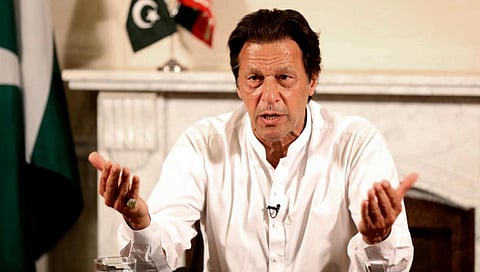Imran Khan has to make some tough choices
The reforms needed to salvage Pakistan’s economy will be nothing short of biting the proverbial bullet

Pakistan Prime Minister Imran Khan’s decision last week to seek a fresh loan from the International Monetary Fund (IMF) and a sharp devaluation of the rupee almost in tandem, must prepare Pakistanis for a period of belt-tightening with clear political implications.
After many years of a practically loose management of the economy — notably under the previous government — Pakistan must now brace for tough times ahead. The adjustments needed to salvage Pakistan’s economy will be nothing short of biting the bullet and that too without precedence in the country’s history.
Faced with what appears to be Pakistan’s worst set of economic challenges, Imran and the other leaders of the Pakistan Tehreek-e-Insaf (PTI) party must quickly rise to a three-pronged challenge.
The IMF has a history of imposing tough conditions on countries that approach the Washington-based lender for bailouts to salvage their economies. Ultimately, an IMF-led cleanup, though painful for the borrowing countries, follows long periods of profligate and reckless spending by the borrowers. That in brief has been Pakistan’s history too.
Going forward, Imran needs to ask himself if he can successfully oversee long overdue economic reforms within Pakistan’s current framework of laws and constitution in considering the first challenge. Given that reckless tax evasion has become a chronic problem with Pakistan’s economy, taking corrective measures in that direction will not be easy.
Those at the centre of this recklessness have repeatedly managed to flout laws simply to avoid accountability. To make matters worse, Imran and his allies do not have a large majority in the parliament to make new laws and amend existing ones in support of a cleanup. Given that the economic challenges have risen out of a lax enforcement of laws in Pakistan, Imran will need to consider the imposition of a de jure or de facto emergency as part of reforms.
Imran will also have to enforce much tighter standards of accountability across the board. So far, the prime minister has maintained a reputation of being personally clean, which is no mean achievement in a country surrounded by a significant black economy. And yet, Imran’s push for a cleanup will just not be convincing for the Pakistani public unless he clearly demonstrates that no exceptions will be made, irrespective of party loyalties of those at fault.
And last but not the least, he must immediately tackle the problem of too many voices emerging from the PTI without a visible centrality of authority. Though Imran is the prime minister, some of his party’s leaders have appeared to be working at cross purposes thereby giving the impression of too many cooks who may eventually spoil the broth.
Last week, one PTI leader even publicly pronounced the new benchmark likely for the Pakistani rupee’s future exchange rate — a matter of speculation that no one from any government should ever display in public. Others have publicly spoken about the future of the China Pakistan Economic Corridor (CPEC), only adding to the recent confusion over this crucial affair and reinforcing the impression of a virtual absence of a central authority among ruling circles.
The challenge at hand is not easy. Though opposition leaders continue to intensify their protests against Imran, they ought to consider themselves fortunate for not having to tackle the challenge of managing Pakistan’s economy.
Beijing’s support
Meanwhile, dealing with the IMF will trigger its own unprecedented challenges for the country. In late July this year, US Secretary of State Mike Pompeo publicly demanded that any potential new IMF bailout for Pakistan must not include funds for the country to pay off its Chinese lenders. In openly raising this matter, Pompeo was targeting China’s promise of investing up to $62 billion (Dh228 billion) in Pakistan under the CPEC. Across Pakistan, many see CPEC as not only evidence of Beijing’s continued support to the country, but also as an assurance of future development and modernisation.
But aside from what motivated Pompeo’s remarks, Imran and his government must appreciate the need to revamp Pakistan’s economy to make room for future obligations. Given that Pakistan’s tax collection framework is one of the worst performing anywhere in the world, there is an urgent need to undertake sweeping and tough reforms.
With less than one per cent of the country’s population filing an annual tax return and just more than 70,000 paying income tax, there is plenty of room for progressive change. Tragically however, no previous government has taken bold reforms that could tackle the menacing effect of widespread tax evasion.
Imran will inevitably face a political backlash if he chooses to tackle the multi-faceted challenges surrounding Pakistan. However, the one important consolation for him and the PTI government must be the light that will shine at the end of the proverbial tunnel — a reformed Pakistan.
Farhan Bokhari is a Pakistan-based commentator who writes on political and economic matters.


